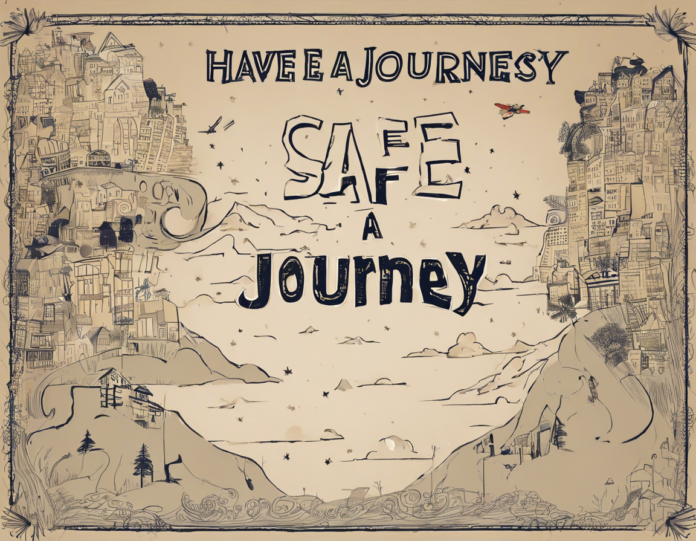Whether you’re a seasoned traveler or embarking on your first adventure, ensuring a safe journey is paramount for a worry-free and enjoyable trip. From meticulous planning to essential safety tips, there are various factors to consider when preparing for a journey. To help you navigate through the intricate process of travel safety, this comprehensive guide covers everything you need to know to stay safe and secure during your travels.
Preparation Is Key
Before you even set foot outside your home, thorough preparation is crucial for a safe journey. Here are some essential steps to take before you depart:
Research Your Destination
- Research your destination extensively to familiarize yourself with the local customs, laws, and potential risks.
- Stay informed about any travel advisories or warnings issued for the region you plan to visit.
- Make copies of important documents such as your passport, ID, and travel itinerary, and keep them in a separate, secure location.
Health Precautions
- Visit a healthcare provider to ensure you are up to date on all necessary vaccinations for your destination.
- Pack an adequate supply of any prescription medications you may need, along with a copy of your prescriptions.
- **Invest in travel insurance that includes coverage for medical emergencies and evacuation.
Secure Your Belongings
- Use luggage with built-in locks or invest in travel locks to secure your belongings.
- Avoid carrying large sums of cash and consider using a money belt or hidden wallet to store valuables.
- **Keep a list of your credit card and passport information in a secure location in case they are lost or stolen.
Stay Safe While Traveling
Once you’ve completed your preparations and embark on your journey, here are some crucial tips to help you stay safe while traveling:
Transportation Safety
- Choose reputable transportation options and research the safety records of airlines, trains, or bus companies.
- Remain vigilant of your surroundings and be cautious of pickpockets and scams in crowded tourist areas.
- **Always wear a seatbelt when traveling by car or taxi, and avoid using motorcycles or vehicles without proper safety features.
Accommodation Safety
- Select accommodations in safe neighborhoods or areas with good security measures.
- Keep your room locked at all times and utilize any additional locking mechanisms provided.
- **Avoid sharing your room number or personal information with strangers and be cautious of who you allow into your accommodation.
Personal Safety
- Remain aware of your surroundings and trust your instincts if a situation feels unsafe.
- Keep a charged phone on hand with emergency contacts programmed and know how to contact local emergency services.
- **Avoid excessive alcohol consumption, especially when alone, to maintain awareness and control in unfamiliar environments.
Emergency Preparedness
Despite your best efforts to stay safe while traveling, emergencies can still occur. Here are some crucial steps to take in case of an emergency:
Emergency Contacts
- Have a list of emergency contacts, including local authorities, your country’s embassy or consulate, and family or friends back home.
- Share your travel itinerary with a trusted individual and check in regularly to keep them updated on your whereabouts.
- **Know how to contact emergency services in the country you are visiting and have a plan in place for communication in case of an emergency.
Medical Emergencies
- Carry a first aid kit with essential supplies such as bandages, antiseptic wipes, and over-the-counter medications.
- Know the location of the nearest hospitals or medical facilities in your destination and have a plan for seeking medical assistance if needed.
- **Inform your travel companions of any existing medical conditions or allergies and ensure they know how to help in case of a medical emergency.
Lost or Stolen Items
- In case of lost or stolen items, report the incident to local authorities and obtain a copy of the police report for insurance purposes.
- Contact your embassy or consulate for assistance in case your passport or ID is lost or stolen.
- **Keep a separate stash of emergency cash in case your main funds are lost or stolen, and store it in a secure location away from your other belongings.
Frequently Asked Questions (FAQs)
Q: Is travel insurance necessary for every trip?
A: While travel insurance is not mandatory, it is highly recommended for every trip to protect against unforeseen circumstances such as medical emergencies, trip cancellations, or lost luggage.
Q: How can I avoid pickpocketing while traveling?
A: To avoid pickpocketing, keep your belongings close to you, use anti-theft bags or wallets, avoid displaying valuable items in public, and stay vigilant in crowded areas.
Q: What should I do if I have a medical emergency in a foreign country?
A: In case of a medical emergency, seek immediate medical attention, contact your travel insurance provider, notify your embassy or consulate, and keep all relevant documents and information handy.
Q: How can I stay safe as a solo traveler?
A: As a solo traveler, stay alert and aware of your surroundings, avoid risky areas, don’t disclose personal information to strangers, and consider joining group tours or activities for added safety.
Q: What should I do if I lose my passport while traveling?
A: If you lose your passport, report the loss to the local authorities, contact your embassy or consulate for a replacement, and follow their instructions for obtaining a new passport.
Q: Is it safe to drink tap water in foreign countries?
A: It is generally recommended to avoid drinking tap water in foreign countries unless it has been treated or boiled. Stick to bottled water to prevent water-borne illnesses.
Q: How can I protect myself from scams while traveling?
A: To protect yourself from scams, research common scams in your destination, avoid unsolicited offers or deals that seem too good to be true, and be cautious of strangers offering help or asking for personal information.
Q: What should I do in case of a natural disaster while traveling?
A: If you encounter a natural disaster while traveling, follow local authorities’ instructions, stay informed through official channels, evacuate if necessary, and contact your embassy or consulate for assistance.
Q: How can I prevent theft in accommodations while traveling?
A: To prevent theft in accommodations, use the room safe if available, lock your doors and windows when leaving the room, store valuables out of sight, and avoid sharing information about your stay with strangers.
Q: What are some essential items to pack for travel safety?
A: Some essential items to pack for travel safety include a first aid kit, travel locks, a money belt, copies of important documents, a portable charger, and a flashlight.
By following these comprehensive guidelines and safety tips, you can embark on your journey with confidence and peace of mind, knowing that you are well-prepared to handle any situation that may arise. Remember, the key to a safe journey lies in thorough preparation, mindfulness, and quick thinking in challenging situations. Wishing you a safe and enjoyable travel experience ahead!

